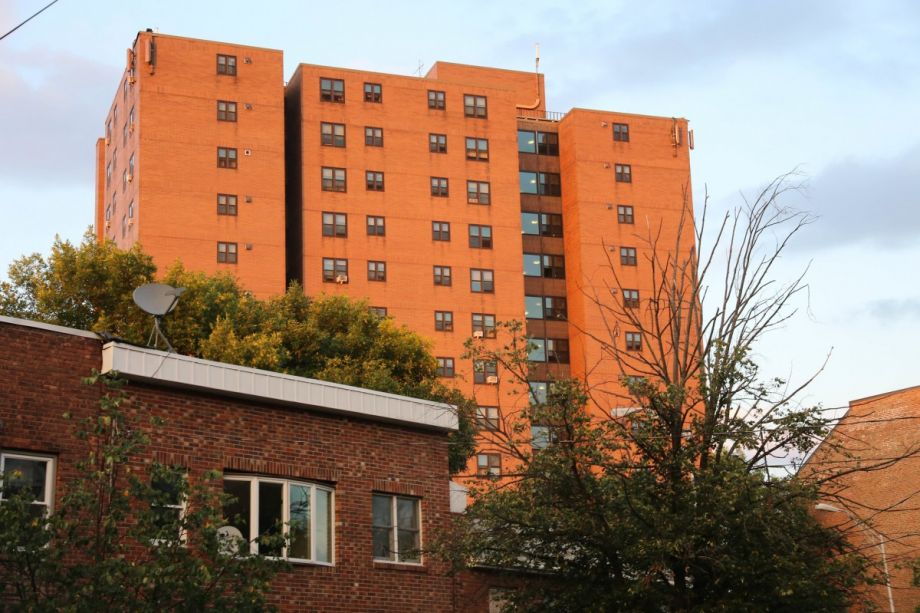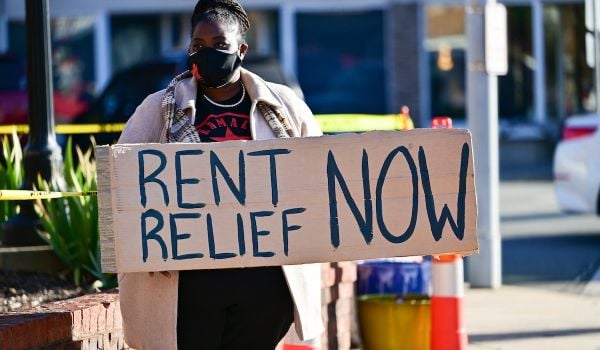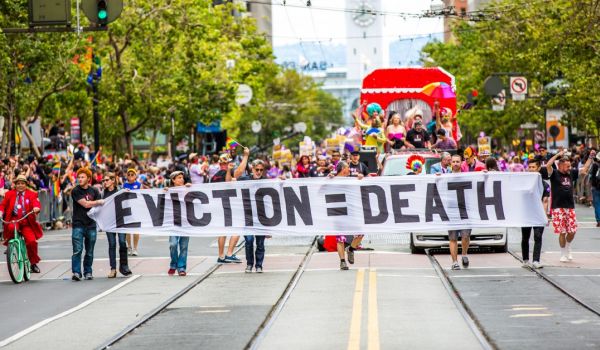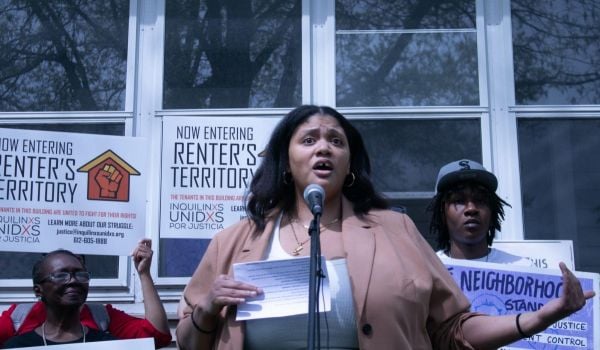This story was co-published in collaboration with Shelterforce, the only independent, non-academic publication covering the worlds of affordable housing, community development and housing justice.
Tenant rights advocates in Albany rejoiced in July 2021 when the city enacted a “Good Cause” eviction bill, the first city in the state to do so. The law restricts building owners from evicting renters without legitimate reason and restricts evictions when rent goes up by 5%. For the more-than-one-year period that the Good Cause eviction law was in effect, it was working for Albany tenants, who were able to renegotiate excessive rent increases and avoid eviction.
“It was empowering tenants themselves to step up and say, ‘You can’t do that,’” says Canyon Ryan, executive director of United Tenants of Albany. “We saw in real time how it fostered tenant empowerment outside of the courts, which was really unique.” Ryan says since the court stopped it, “the state needs to step up and fix it.”
On March 2, a judge in New York state’s highest court sided with a group of landlords, ruling that Albany’s Good Cause law was illegal because it preempted the state’s eviction laws. Attorneys representing the City of Albany appealed that decision on March 20, arguing that the court had misunderstood the application of local law to state law.
The city’s motion referred to previous court decisions, which found that “[T]he mere fact that a local law may deal with some of the same matters touched upon by State law does not render the local law invalid.” The court won’t decide whether to hear re-arguments until April 17, an attorney for the tenants’ side tells Next City/Shelterforce.
For now though, Albany’s Good Cause law is voided. A similar ruling voided a Good Cause law the following week in Poughkeepsie, and both orders came after a similar ruling in Newburgh in December.
The wave of court decisions has bolstered advocates’ calls for the legislature and Gov. Kathy Hochul to pass a statewide Good Cause law banning no-cause evictions and guaranteeing offers of renewal at the end of a lease.
The state assembly’s budget contains language supportive of Good Cause, but the governor has given mixed signals; she was dismissive of the bill earlier this month, saying she was focused on her own housing plan of building 800,000 new homes, despite tenant rights advocates pointing to evidence that Good Cause measures protect renters from predatory landlords.
One case study on the law’s impact is the Bleecker Terrace Tenant Association, where multiple tenants were able to push their new building owner to revise their rent increases. The tenants live in a 279-unit building that holds about 500 people. Formerly called Bleecker Terrace, the building was renamed “Capital Crossings” when a private equity firm called M3 Equities LLC purchased the property in 2022. (The building had already changed hands less than a year before, in July 2021.) As soon as it completed the purchase, M3 Equities began hiking rents.
The nonprofit United Tenants of Albany began organizing with tenants after Good Cause passed in the city, forming the Bleecker Terrace Tenant Association. After a meeting between local Common Council member Alfredo Balarin, attorneys from The Center for Law and Justice and the Legal Aid Society, and the head of Opus Management — the company M3 hired to manage the building — tenants were able to get written concessions in August 2022.
In an email viewed by Next City/Shelterforce, Opus Management attorney Philip Murphy wrote, “As discussed at our 7/27 meeting, Capitol Crossings is committed to capping rent increases paid by individual tenants by no more than 5% upon lease renewals.” The letter states that the initiative was taken “to relieve the financial stress tenants in the Capitol Crossings community are under due to the turbulent economic times.”
The concessions came after the state’s Supreme Court had rejected Albany’s Good Cause law in June 2022. However, the law was still in effect because the city appealed and was granted a stay while it was shunted off to the Supreme Court’s appellate division.
(Another reason the management company may have been eager to come to an agreement is to deflect bad press after one of its security guards brought an AR-15 to a Juneteenth celebration at the building a few months earlier.)
Last November, despite their written assurance, Opus reversed course and issued rent increases above 20% , perhaps sensing the law was on weak footing.
Laurie Buitrago, the secretary of the Bleecker Terrace Tenant Association, says she received a notice informing her of a 26% rent increase in November. She invoked Good Cause and its limits on rent increases, and was given another lease with a 5% rent increase, as were other tenants who invoked Good Cause.
“Good Cause when used properly does in fact work,” Buitrago says.
Albany’s Good Cause law only allowed an eviction with a court order, which could only be obtained if the landlord established that one of the 10 permitted grounds for eviction could be proven. In addition to keeping people from being evicted by landlords seeking rent hikes, the law protected tenant organizers from retaliatory evictions as a result of their organizing.
The law also limited excessive rent increases by barring landlords from evicting tenants for non-payment after an “unconscionable” rent increase. It gave the court leeway for deciding when a rent increase was unconscionable based on the tenant’s income and market conditions, but stated that an increase of 5% was enough for a judge to rule in a tenant’s favor.
After this month’s decision voided the law, Opus Management again started issuing leases to tenants with rent increases well above 5%.
Buitrago had already signed her lease with a 5% rent increase, but others have been given notice of 16% and 20% increases. She says the building has about 40 people who are long-time residents, including many who are seniors or on fixed income who are at risk of being forced out if their rents spike.
Opus Management told Buitrago that their attorney misspoke when he promised rent increases would be limited to 5% last August. Yet the attorney’s email also cc’d Opus CEO Seema Gruman and leaves little room for misinterpretation.
Tenants are looking into their legal options, but they’re hoping that the state legislature and governor come through.
“Most folks are terrified. No one knows what this is going to look like if the state does not include Good Cause, or some portion of Good Cause” in the budget, Buitrago says.
Buitrago has heard some elected officials say that the law would tie the hands of landlords, but she says the law specifically singles out bad actors.
“If it affects a landlord negatively, it’s probably because they are a slumlord,” she says.
A large group of Albany tenants, including United Tenants of Albany and Bleecker Terrace Tenant Association, met with their local Assemblywoman, Patricia Fahy, to request support for Good Cause. But Fahy was steadfast in her opposition, they say.
“It decidedly went nowhere, in the nicest of terms,” Ryan says of the meeting. Fahy’s office did not respond to a request for comment.
The fate of a statewide version of the law is uncertain; the state’s Assembly and Senate included language in their versions of the budget supportive of good cause, but refrained from pushing for any specific language. The Assembly bill contains a resolution saying the house would “continue to explore pathways to protect tenants from arbitrary and capricious rent increases and unreasonable eviction,” but intentionally left out specifics, Assembly speaker Carl Heastie said.
That means even if the bill makes it into the state budget, key provisions might be left out, and the statewide legislation could end up being weaker than any of the citywide legislation that was shut down by judges.
If the state legislature does not step up to pass Good Cause, there’s still a chance that Albany’s appeal could get traction. The city argues in its motion that state property law “does not confer upon landlords a right to terminate residential leases at their sole discretion.”
Ryan says that Albany’s Good Cause law finally gave tenants some power against their landlords.
“A lot of tenants would call us and say, ‘Can my landlord just not renew my lease? He doesn’t want me here anymore, because I fell behind a couple of months ago, and I’m all caught up.’” With Good Cause in place, Ryan says, they could answer “No, he can’t evict you.” Now, landlords are free to deny lease renewals for any reason.
“For the first time in 50 years, United Tenants of Albany had the opportunity to tell tenants that your landlord can’t evict you for no reason,” Ryan says.
This story has been updated to correct the spelling of Bleecker Terrace.
This article is part of Backyard, a newsletter exploring scalable solutions to make housing fairer, more affordable and more environmentally sustainable. Subscribe to our weekly Backyard newsletter.

Roshan Abraham is Next City's housing correspondent and a former Equitable Cities fellow. He is based in Queens. Follow him on Twitter at @roshantone.


















